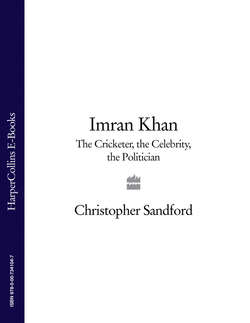Imran Khan: The Cricketer, The Celebrity, The Politician

Реклама. ООО «ЛитРес», ИНН: 7719571260.
Оглавление
Christopher Sandford. Imran Khan: The Cricketer, The Celebrity, The Politician
Contents
ONE Only a Game
TWO Of Hospitality and Revenge
THREE The Swinger
FOUR ‘War Without the Nukes’
FIVE The Downhill Struggle
SIX Captain and Crew
SEVEN The Contrast Principle
EIGHT Dropping the Pilot
NINE ‘If They Say They Were Squeezing the Ball — Fine; They Were Squeezing the Ball’
TEN All-Rounder
Career Highlights
LANDMARKS
BATTING AND FIELDING
BOWLING
TEST MATCH HUNDREDS
10-WICKET MATCHES
TEST CAREER SUMMARY — BATTING
TEST CAREER SUMMARY — BOWLING
Bibliography
Sources and Chapter Notes
Index
Acknowledgements
Copyright
About the Publisher
Отрывок из книги
THE CRICKETER, THE CELEBRITY, THE POLITICIAN
THE BIOGRAPHY CHRISTOPHER SANDFORD
.....
Besides cricket, that drive and push found expression in longdistance running, javelin- and discus-throwing, and various other demonstrations of adolescent physical prowess. Imran was a full-time member of the Lahore team in the 1970–71 season, where he was lucky enough to have his cousin Javed Burki as captain. Javed cannily used the 18-year-old tear away in short bursts. In the BCCP Trophy against Rawalpindi Blues (surely a song title) Imran took two for 26 and one for 10, followed by the more impressive first innings figures of 18–3–54–6 against Pakistan Railways. In the cup semi-final against Karachi he scored 17 and 60 batting at No. 3, but was said to have served up a ‘dog’s dinner’ with the new ball. Moving across to the three-day Quaid-e-Azam Trophy, Imran recorded figures of five for 75 off 16 overs against Rawalpindi, missed the grudge match against the government’s Public Works Department, but returned to play in the losing semi-final against Punjab University, where he took two for 96 in the first innings and one for 10 in the second, while scoring 36 and 68 in the middle order. At the end of the season Imran had a first-class batting average of 31.69 and a bowling average of 21.60. His first full year in domestic cricket was also to be his last, because he was rarely seen again in Pakistan after that except at representative level.
As Imran played cricket, the situation in the country as a whole was ‘desperate’, he later recalled. The first ever fully democratic national elections were due to have been held on 5 October 1970, his 18th birthday, but had to be postponed by two months because of the cataclysmic damage caused by floods in East Pakistan, where 200,000 people died and some 12 million lost their homes. It was generally agreed the relief operations were not well handled by the government. The result of the election gave the Bengali militant Sheikh Mujibur Rahman (popularly known as Mujib) and his Awami League an absolute majority in the National Assembly and all but two of the 162 seats allotted to East Pakistan. Zulfikar Ali Bhutto, a champion of Islamic socialism, a strong army and ‘a 1,000-year war with India’, emerged as the leader in the West. The irreconcilable differences of the two men’s programmes and the growing threat of secession by the Bengalis set in train the breakdown first of parliamentary government and eventually of all domestic law and order. President Yahya Khan, the hard-drinking, straight-talking former army chief, first refused to honour the election results and then sent 40,000 troops to arrest Mujib and suppress the rioting that erupted in Dhaka, the capital of East Pakistan. Unrelieved suffering from the cyclone, coupled with brutal suppression by Yahya’s army, may have killed as many as 500,000 more men, women and children over the next month. The confrontation eventually led to the events that brought about Pakistan’s dismemberment in December 1971. Even before that, Imran had seen ‘AIR-RAID SHELTER’ and ‘CARELESS CHAT COSTS LIVES’ notices being tacked up on public buildings, just as he had in 1965. More and more recruits signed up for Yahya’s, or Bhutto’s, army; I was told that the Khan family had been ‘rightly alarmed’ they would be evicted from Zaman Park, either by invading Bengalis or the Indians, if not by government fiat, and forcibly resettled, much as had happened following Partition in 1947. In the end they kept their home, although in the most harrowing circumstances. India again went to war with Pakistan in 1971 just as the latter finally tore itself apart. In the ensuing 13-day bloodbath, some 300,000 Pakistani civilians died and the country’s armed forces were crippled for a generation. As the author Tariq Ali says, in less than a fortnight the nation ‘lost half [its] navy, a quarter of its air force and a third of its army’. India and its Soviet ally jointly declared the outcome of the war, and the emergence of Bangladesh from the ruins of East Pakistan, to be a triumph for socialist and democratic principles.
.....